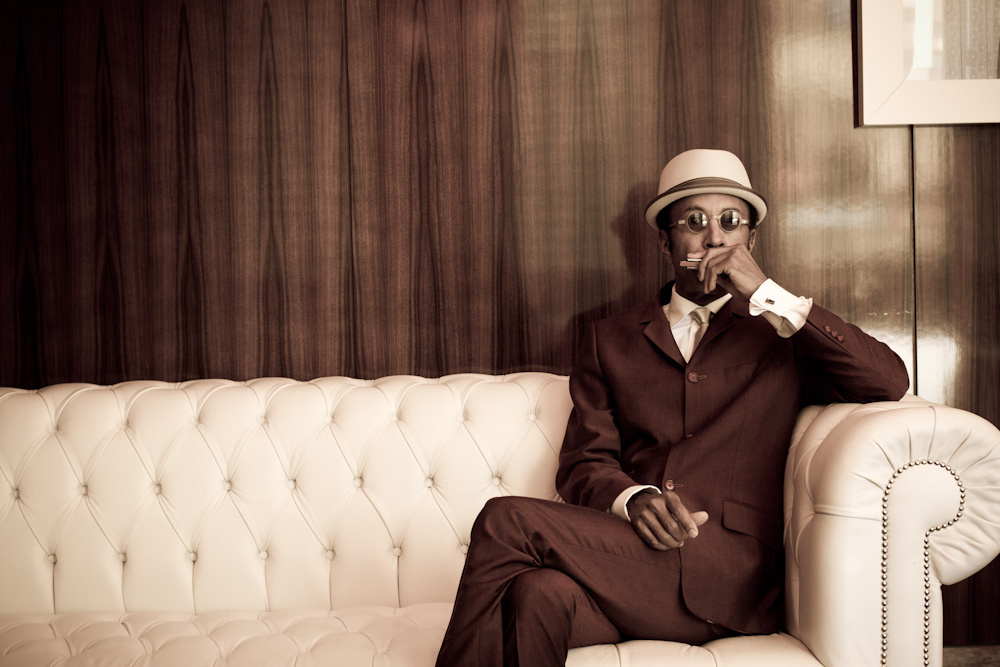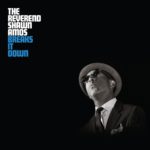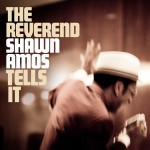
By Iain Patience
Now here’s a rarity for you: from the pages of Forbes Magazine to the pages of Elmore Magazine. Not many, if any, bluesmen have achieved that.
Shawn Amos is a an astute, modern bluesman of note, with a fast-rising fanbase, a new album – The Reverend Shawn Amos Loves You – charting high in the Top 100 American charts and a growing gang of loyal followers. Based in LA, he laughs when asked about his blues-background and if his childhood was typical of many others: “I’m a Hollywood, California bluesman. A colored man, but not from a typical blues background,” he says. Then adds with evident insight, “Blues music as a genre is expanding, it’s expansive too. It’s not a case of who has the right to play the music. It needs sincerity rather than hypocrisy.” All of which is just as well, because Amos is the son of affluent businessman, Hollywood talent-spotter-turned-baker, Wally Amos, creator of Famous Amos Chocolate Chip Cookies, a previous, raging business success in the Los Angeles area, now part of the international Kellogg’s empire.
Amos recalls his schooldays as the sole kid of color in a school otherwise populated by peers who were largely affluent and white, and often viewed him as something of a cultural curio. It therefore comes as no surprise to learn that Amos started out with an interest in Soul music and much of the typically US modern roots music, fueled by Chess Records, Neil Young and Bob Dylan. As a youth at college, he read as much as he could, and was particularly impressed by the work of Peter Guralnick. “Soul music became my first introduction to my own history,” he recalls. “The more I discovered through the music and the books, the more I realized that in truth I knew painfully little. I was one of the only black kids not exposed to his own culture. It was unnerving at times.”
As he dug deeper into the music and culture he became increasingly interested in the work of those singer/songwriters like Dylan and Neil Young who were developing music as a form of strong, vivid story-telling. “As a result, I went down the folk-roots route. I didn’t explore blues music. I felt it was too stereotypical for me to get into blues. I made American-ish albums, then one as a tribute to my mother, made to reflect the times she lived in.” Amos’s mother had been a successful club and show-singer, recording with Mercury Records in her prime.
But interestingly and tellingly, perhaps, throughout this period he was listening to blues all the time but never feeling that he was, “…owning it myself.” With the rise of guitar culture, rock n’ roll grabbed his attention, as did the work of Muddy Waters and Howlin’ Wolf. Around this time, Amos turned to playing harp, an instrument that was steadily growing in popularity.
Gradually, however, Amos turned to blues music and turned into a bluesman with a keen eye on the need to let the music breathe and develop: “It’s not as complex a form as some others. It needs the bar to be raised. It spoke to me, eased my pain,” he explains. And with his last two offerings, the six-track EP, …Tells It, and the current full album, …Loves You both rolling well, his philosophy seems to have succeeded in fair measure. “I feel like I found the key to my heart. Something that’s not as easy to get to with other kinds of music. I want to create music that’s grounded but deeply and fiercely my own as much as possible. I like it to be soulful, like Van Morrison, intense and strong.”
Amos also acknowledges that the “whole blues music thing” is constantly changing. Albums cannot be seen as part of a history lesson, as often seems to be the case with some of the old blues-guy’s offerings today. Instead, Amos views them “as part of a changing sound, stops along the blues highway.” Something he believes has always been at the root of the music itself: “I like that about the southern influence, nowadays it’s partly also rooted in the Chicago sound.”
Amos, previously named in 2012 as one of Forbes Magazine’s “Up and Comers,” due to his entrepreneurial abilities and foresight, understands the need for a business-head in the tough music world, and views his future with an optimistic but sensible interest. “I want to do more and more live shows. That’s the key. It’s what settles it for me,” he confirms. “I’m really focused now. Blues music can be a standard-bearer. It has the power to represent the way ahead, to the future, but with a link to the past.”





Be the first to comment!